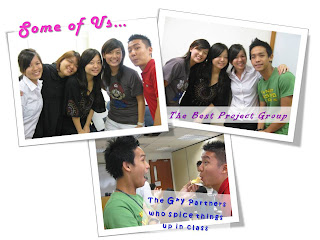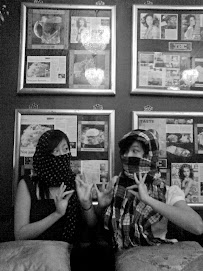P.s.: It is finally time for the final blog post! (Yay!)

In my first blog post, I mentioned that effective communication takes the effort of both parties - the speaker and the receiver. The 12-week course has made me believe even more strongly in my point. In order for the message to be brought across from the speaker to the receiver without misinterpretation, the speaker would have to use the right words in the right tone, while the receiver would have to play an active listening role. However, active listening is an essential component which many of us tend to overlook, including myself. I have been putting in more effort in this aspect of communication but I am still guilty at times of not listening actively. (One such example is when I think of food while Ms Kim talks!)
Oral presentation was part of the course that left the greatest impression on me. I mentioned previously that public speaking is one of human's greatest fears and it is definitely mine as well. We were taught that preparation before the presentation is essential and in fact, very important. As i watched the playback of my presentation, I realised that my body language and the way I spoke was a little unnatural. On top of being nervous, this could also be attributed to the fact that I was not prepared enough. Insufficient preparation also led to a lower level of confidence as I spoke. This is a precious lesson learnt. In future, if I have to present my ideas publicly again, I will definitely familiarize myself with my slides and speech, as well as the topic to be presented.
In addition, I noticed that several classmates nodded their heads as I presented. These non-verbal cues allowed me to know that they understood what I was trying to bring across. In fact, I have to thank them as these NVCs also helped to assure me as I spoke and helped to soothe my nerves. (Thank you so much!)
Another component of the course which I find very useful is the 'Job Search' component. During those sessions, we were taught the proper way of constructing a convincing job application letter and a resume, as well as interview skills. These are skills that are not taught in any other courses, but are essential skills that will benefit us when we apply for internships or jobs. Before attending this course, I did not realise the importance of a good resume and I had been using my friends' resumes as templates. All those resumes that I had did not cater to specific jobs nor did they look professional and convincing. Now, I am more confident of being offered an interview.
In actual fact, I have never been to an official job interview. The mock interview session that we had definitely gave me a rough idea of what to expect at an interview. Now, I understand that not only do we have to learn to 'sell ourselves', we also have to be confident, maintain eye contact with the interviewers and be appropriately groomed. With these interview tips and with sufficient preparation, I am now more certain of how to prepare for an interview in future.
Oral presentation was part of the course that left the greatest impression on me. I mentioned previously that public speaking is one of human's greatest fears and it is definitely mine as well. We were taught that preparation before the presentation is essential and in fact, very important. As i watched the playback of my presentation, I realised that my body language and the way I spoke was a little unnatural. On top of being nervous, this could also be attributed to the fact that I was not prepared enough. Insufficient preparation also led to a lower level of confidence as I spoke. This is a precious lesson learnt. In future, if I have to present my ideas publicly again, I will definitely familiarize myself with my slides and speech, as well as the topic to be presented.
In addition, I noticed that several classmates nodded their heads as I presented. These non-verbal cues allowed me to know that they understood what I was trying to bring across. In fact, I have to thank them as these NVCs also helped to assure me as I spoke and helped to soothe my nerves. (Thank you so much!)
Another component of the course which I find very useful is the 'Job Search' component. During those sessions, we were taught the proper way of constructing a convincing job application letter and a resume, as well as interview skills. These are skills that are not taught in any other courses, but are essential skills that will benefit us when we apply for internships or jobs. Before attending this course, I did not realise the importance of a good resume and I had been using my friends' resumes as templates. All those resumes that I had did not cater to specific jobs nor did they look professional and convincing. Now, I am more confident of being offered an interview.
In actual fact, I have never been to an official job interview. The mock interview session that we had definitely gave me a rough idea of what to expect at an interview. Now, I understand that not only do we have to learn to 'sell ourselves', we also have to be confident, maintain eye contact with the interviewers and be appropriately groomed. With these interview tips and with sufficient preparation, I am now more certain of how to prepare for an interview in future.
To conclude my final blog post (and final assignment for the course!), I have to say that I did not regret taking up this course as the skills that I have learnt will be beneficial for life. It was also great to make friends with my coursemates and I really did enjoy the company of the class (All those squeezing-into-the-lift times). However, I have to admit that I did curse the course once in a while when there was too much work piling up. The weekly blog posts often made me dread the arrival of the weekends!
Dear all: Please do keep in contact, and TIMBRE AFTER EXAMS!
A collage to end off my post. My apologies to those not captured in my camera. CG, please upload the photos! (:
Dear all: Please do keep in contact, and TIMBRE AFTER EXAMS!
A collage to end off my post. My apologies to those not captured in my camera. CG, please upload the photos! (:




.jpg)

